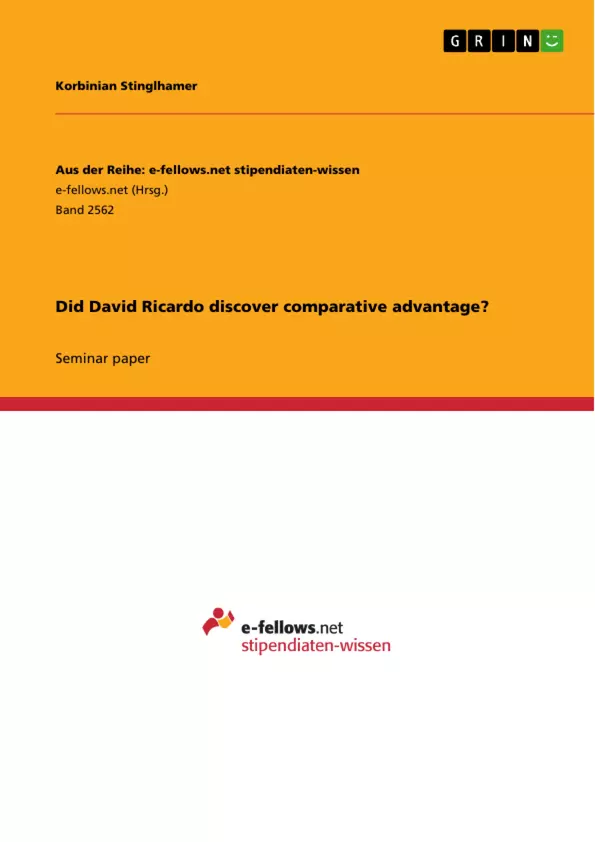This paper examines if the law of comparative advantage really was discovered by David Ricardo. It investigates the arguments against and for David Ricardo’s discovery made by three modern authors, Thweatt (1976), Ruffin (2002), and Gehrke (2015). It analyzes and evaluates the argumentation made by these authors in order to identify the most compelling interpretation of Ricardo’s discovery.
Thweatt argues that Ricardo’s writing about comparative advantage was probably not his own. Thweatt claims that Ricardo probably took the concept of comparative advantage from Mill.
In contrast, Ruffin states that there is evidence that Ricardo very well discovered comparative advantage on his own. Ruffin’s key evidence for this argumentation are three letters, which should indicate that Ricardo worked out comparative advantage during October 1816.
Finally, Gehrke claims that Ruffin’s interpretation of the three letters is not solid. According to Gehrke, there is no evidence that Ricardo really worked out comparative advantage.
Inhaltsverzeichnis (Table of Contents)
- Introduction
- Arguments against Ricardo`s discovery
- Arguments for Ricardo`s discovery
Zielsetzung und Themenschwerpunkte (Objectives and Key Themes)
This paper explores the debate surrounding David Ricardo's discovery of comparative advantage, analyzing the arguments presented by Thweatt, Ruffin, and Gehrke. The paper aims to identify the most compelling interpretation of Ricardo's role in the discovery of this key economic concept.
- The nature of Ricardo's contributions to economic theory, specifically comparative advantage.
- The role of absolute advantage in Ricardo's economic thought.
- The interpretation of Ricardo's writings and correspondence.
- The influence of other economists, such as Mill, on Ricardo's work.
- The evidence supporting and opposing Ricardo's discovery of comparative advantage.
Zusammenfassung der Kapitel (Chapter Summaries)
- Introduction: This chapter introduces the debate about whether David Ricardo discovered comparative advantage. It outlines the arguments made by Thweatt, Ruffin, and Gehrke, and the purpose of the paper.
- Arguments against Ricardo`s discovery: This chapter presents Thweatt's arguments against Ricardo's discovery of comparative advantage. It focuses on Thweatt's contention that Ricardo's work primarily dealt with absolute advantage, and that his discussion of comparative advantage was brief and unconvincing.
- Arguments for Ricardo`s discovery: This chapter presents Ruffin's arguments in favor of Ricardo's discovery of comparative advantage. It highlights Ruffin's reliance on three letters from Ricardo in 1816, which he interprets as evidence for Ricardo's discovery.
Schlüsselwörter (Keywords)
This paper focuses on the economic concepts of comparative and absolute advantage, analyzing the works of David Ricardo, John Stuart Mill, and other prominent economists. It investigates the role of letters and other primary sources in interpreting economic history, particularly in determining the discovery of economic principles. The paper also explores the relationship between economic theory and the development of free trade policies.
- Quote paper
- Korbinian Stinglhamer (Author), 2016, Did David Ricardo discover comparative advantage?, Munich, GRIN Verlag, https://www.hausarbeiten.de/document/377205


